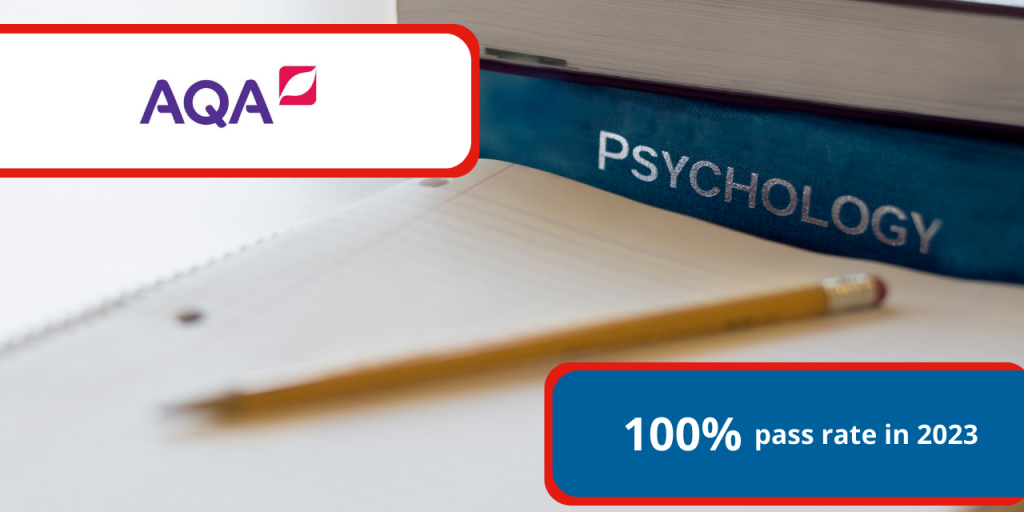Call free on: 0800 389 2839
Call free on: 0800 389 2839
Explore Our courses
Psychology GCSE
AQA

Open up your mind to the scientific study of human behaviour, through our GCSE Psychology online course.

Multi-buy GCSEs:
Purchasing more than one GCSE or IGCSE? Use voucher code GCSEMB10 to receive a 10% off at checkout.
Psychology is a subject that offers a unique journey of self-discovery. Not only will it help you to interpret the behaviour of those around you – it also enables you to analyse your own interactions with different personality types, and what drives you to react in different situations.
By learning how to scientifically study the mind, you’ll be able to make observations on human behaviour. From exploring what motivates and challenges us, to how we change – psychology helps us to tackle both personal and social problems.
This insightful subject is taught through a variety of topics such as memory, perception, social influence, the brain and neuropsychology. Choosing this course opens up opportunities to become more employable and highly-skilled, as well as informing how you currently view and understand society.
Why study Psychology?
GCSE Psychology will enable you to combine research and analytical tools, with an ability to become a better communicator. It can also help provide sound skills in how to resolve conflict. Studying GCSE Psychology online is ideal if you:
- Would like to increase your skill set – particularly in the areas of analytical research, team working, communication skills, handling data, statistics and problem solving.
- Have an interest in finding out more about how, and why, we behave as we do.
- Want to learn more about research methods and how they can be utilised.
- Aspire to progressing onto a science-based apprenticeship.
Future opportunities
- Studying other sciences, or Psychology, at A level.
- A range of careers in fields such as psychology (occupational, clinical, health, educational or high-intensity psychologist roles), advertising, psychotherapy, counselling, consultancy and advice work.
Course content
Section 1: Research methods, Part A
- Asking questions – developing a hypothesis
- Selecting participants
- Ethics in psychological research
- Describing and evaluating experiments
Section 2: Memory
- Process of memory – encoding, storage and retrieval
- Structures of memory
- Memory as an active process
Section 3: Perception
- Sensation and perception
- Visual cues and constancies
- Gibson’s direct theory of perception
- Gregory’s constructivist theory of perception
- Visual illusions
- Factors affecting perception
Section 4: Development
- Early brain development
- Piaget’s theory of cognitive development
- Piaget’s four stages of development
- Applying Piaget’s theory to education
- Dweck’s mindset theory of learning
- Learning styles and Willingham’s learning theory
Section 5: Research methods, Part B
- Designing research
- Natural and field experiments
- Questionnaires and interviews
- Case studies
- Observations
- Reliability and validity
- Correlation
- Types of data
- Data handling
Section 6: Social influence
- Conformity
- Obedience
- Prosocial behaviour
- Crowd and collective behaviour
Section 7: Language, thought and communication
- Language and thought
- Human and animal communication
- Non-verbal communication
- Explanations of non-verbal behaviour
Section 8: Brain and neuropsychology
- Structure and function of the nervous system
- Neuron structure and function
- Structure and function of the brain
- Introduction to neuropsychology
Section 9: Psychological problems
- Introduction to mental health
- Effects of mental health problems
- Characteristics of clinical depression
- Theories and treatment of depression
- Characteristics of addiction
- Theories and treatment of addiction
Study GCSE Psychology with us and benefit from:
- Flexible learning
- Support from a personal tutor by email, phone or Skype
- Any time enrolment
- Our exam booking service
- Assignments with tutor feedback
- Ongoing support from Student Support
- Forums to discuss your course with other students
learn@nec
Choose when and where you access your course, using learn@nec our 24/7 learning platform.
This easy-to-use learning platform includes interactive checkpoints, quizzes and activities to help you evaluate your progress.
Your tutor
You’ll have access to support from a personal tutor. All NEC tutors are subject experts, with experience of supporting online learners.
Meet Mo who is just one of our first-class Psychology tutors:
“I have over 20 years experience of teaching both Psychology and Sociology and I have worked as a senior examiner for a major exam board for many years. Psychology is a fascinating subject and offers us an insight into individuals and differences in behaviour. The course allows you to learn about various aspects of Psychology from what makes an individual obedient to the causes of mental illness. I am still learning new and exciting aspects of human behaviour. Which aspects of the specification interest you, will be a really personal discovery, this will allow you to investigate and learn more as your curiosity is raised. This means that I really enjoy working with students as they will always show me some insight or detail that I have never considered and it makes your studies collaborative.”
What you need to know
Exam board
- AQA 8182
Format
- Online learning with support from a personal tutor
Hours
- Complete at your own pace
- Approx. 120-150* hours plus time for completing assignments
*The specification suggests that 150 hours is needed. You’ll also need time to complete assignments and prepare yourself for exams and some courses like English literature involve a lot of reading. Everyone is different so it’s impossible to say with certainty how long a course will take you, but you should expect to spend longer than 150 hours. Taken across the length of time we recommend, this equates to approximately 4 hours per week. This will increase if you choose to take it over a shorter time frame or may be less if you are retaking a subject and have covered a lot of of the course content.
Assignments
- 10 assignments (one introductory) – these do not contribute towards your final grade
Resources
- No additional set texts required
Requirements
- Internet access
- Computer operating system and browser to support learn@nec
What's included?
Our course fees are clear and transparent to help you plan for any additional costs.
Your course fee includes:
- 24/7 access to learn@nec platform and resources
- Expertly designed online course materials (including ebook versions of textbooks where specified) that you need to complete the course and written to cover the carefully selected awarding body specification
- Support from our Student Services team
- Structured assignments to help you track your progress throughout your course
- Guidance from your tutor for up to 18 months from your date of enrolment
- Constructive feedback on your assignments from your tutor, to help you improve and prepare for exams
- Guaranteed exam place
- NEC’s guide to study skills: How to Succeed as an Independent Learner
- Spelling, punctuation and grammar guide
- Time planner template to help you plan your study timetable
- Information on how to apply for exams
Your course fee does not cover:
- Any fees in relation to exam entries or assessments
- Centre Assessment Grades (CAG) in the event of exam cancellation
- Recommended textbooks for additional reading or set texts
- Equipment for core practicals
If you need more support, you can purchase:
- Online tutorials – if you need help with a specific topic you can arrange a 30 minute or 1 hour tutorial
- Additional past paper marking – to help with your exam preparation
- Revision tutorial – to plan your revision and explore revision techniques
- Help with your UCAS application service
For further information on additional/optional support you can purchase, please visit our additional services page.
Exams and assessment
Exams (two):
- 50% of marks (1 hour 45 minutes)
- 50% of marks (1 hour 45 minutes)
There is no non-exam assessment (NEA) for this course
Additional support if you’re under 18
We know that our younger students often need an extra helping hand with their studies. In our experience learning online works best when either a parent or guardian are involved. This is why NEC has developed our unique Progress Tracker to help you to support your child.
NEC’s Progress Tracker will allow you to easily track your child’s progress across their subjects and gain insight to how well they are doing through access to their assignment grades and tutor feedback.
Read more about how we work with young students who are studying at home or through a school.
Arrange a callback with a member of our Course Advice Team.
Would you like to talk to our Course Advice Team about the best route for you? Visit our Contact Us page, fill in the form and a member of the team will get back to you!
Key facts
Course Fees £445
It’s your choice: you can pay in full at the point of enrolment, or you can spread the cost over monthly instalments with our finance offer. We offer a choice of six or 12 month repayment plans, with 0% APR as standard.
To pay in instalments you will need to enrol by telephone.
Representative example:
Course fee: £445
Deposit: £44.50
Amount of credit: £400.50
Monthly payment: £66.75
Duration of agreement: 6 months
Total repayable: £445
Rate of interest: 0% (fixed)
0% APR representative.
The National Extension College (NEC) work with finance company Deko. For more information on our relationship with Deko and repayment plans click here.
learn@nec is our virtual learning environment, the gateway to your course and the NEC community. All the resources you need to study are here and you have the flexibility to access them wherever you want, whenever you want
Study at your own pace.
There are no academic requirements for this course.
Course materials are written in English so a good level of written English is required.
As part of NEC’s mission to widen participation our team is happy to discuss payment options unavailable online. Please contact our team on 0800 389 2839 or email info@nec.ac.uk


